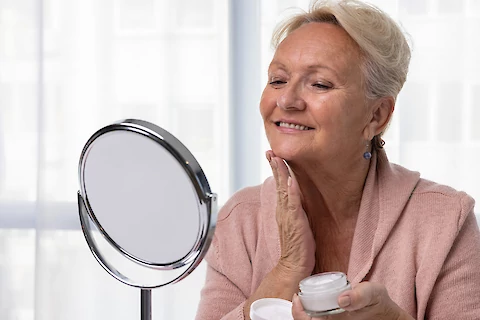
As the winter chill sets in, skin can often bear the brunt of the changing weather. This is especially true for older adults whose skin tends to be more sensitive and prone to dryness. Fortunately, with a little knowledge and some simple steps, it's possible to keep your skin healthy and comfortable even in the coldest months.
The Importance of Hydration
Maintaining adequate hydration is important year-round, but wintertime can sneakily lead to dehydration due to lower thirst response. Dehydration can cause your skin to become dry, flaky, and less resilient. Therefore, seniors are encouraged to drink water regularly, even if they don't feel thirsty. Herbal teas and soups are also excellent warm alternatives to promote hydration. Caregivers can support hydration by providing easy access to fluids and frequently reminding seniors to drink.
Choosing the Right Moisturizers
Moisturizers play a critical role in preventing and treating dry skin. They trap moisture in your skin, making it look healthier and feel softer. However, not all moisturizers are suitable for older adults' skin. Opt for products that are fragrance-free and hypoallergenic to avoid irritation. Moisturizers that contain ingredients like hyaluronic acid, ceramides, and glycerin are usually beneficial. Remember, the best time to apply moisturizer is after a shower or bath when your skin is still damp. This helps lock in maximum moisture.
Protecting Skin from Harsh Weather
Cold, dry winter air can rob the skin of its natural moisture, leaving it dry and vulnerable. To protect the skin, limit exposure to cold weather as much as possible. When going outside, remember to wear gloves and scarves to shield your skin from cold winds, rain, and snow. Inside, consider using a humidifier to counteract the drying effect of indoor heaters. Encourage caregivers to be proactive in these protective measures, especially when assisting seniors with dressing up for outdoor activities.
Maintaining a Healthy Diet for Skin Health
Your skin reflects what you eat. A diet rich in vitamins, antioxidants, and omega-3 fatty acids can contribute to maintaining skin health. Foods such as fish, nuts, fruits, vegetables, and whole grains are good for your skin. Additionally, deficiencies in essential nutrients can impair skin health, so consider a multivitamin supplement if needed. Caregivers can ensure seniors eat balanced meals and can consult with a dietician or healthcare provider for personalized advice.
Prevention of Skin Tears and Other Complications
As skin ages, it becomes thinner and more susceptible to tears, mainly when it's dry. An essential part of preventing skin tears is ensuring the skin stays moisturized. Also, consider using gentle, alcohol-free cleansers, as harsh soaps can strip the skin of its natural oils, leading to dryness. Caregivers should be trained to assist seniors delicately, avoiding actions that can lead to skin injuries.
Keeping senior skin healthy during winter doesn't need to be complicated. With a few simple steps such as staying hydrated, choosing the right skincare products, protecting skin from harsh weather, and maintaining a balanced diet, older adults can combat the harsh effects of winter. Remember, prevention is better than cure. These practical tips are not only for comfort but also crucial in preventing skin tears and other complications.
Help For Seniors Through Winter and Beyond
At Senior Helpers Ellis County, we believe in empowering our seniors to take the best care of themselves. So, whether you're living in Ennls, Mansfield, Midlothian, Alvarado, or anywhere else in Ellis County, and you need extra help in managing your or your loved one's skin health this winter, don't hesitate to contact us. We're here to help because your well-being is our priority.